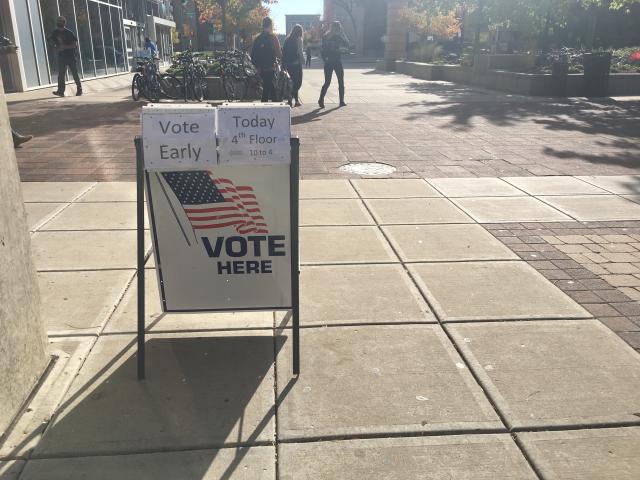






 Libraries and three campus location, including East Campus Mall (pictured), are among the new sites for early voting this year. (Ellie Herman/Madison Commons)
Libraries and three campus location, including East Campus Mall (pictured), are among the new sites for early voting this year. (Ellie Herman/Madison Commons)
When Leah Voskuil was 7 years old, she wanted Hillary Clinton to be “President of the Universe.” Fourteen years later, Voskuil almost started crying in the Madison city clerk’s office as she voted for Clinton for president of the United States six weeks before Election Day.
Working as an Ask. Learn. Vote! Intern at the Wisconsin Alliance for Women’s Health, Voskuil showed support for her preferred candidate by early voting, officially known as in-person absentee ballot voting.
“There are so many particularities with this election, so I think having that ability to go in early is very important,” Voskuil said. “But ultimately, I think it’s still going to be the same chaos on Election Day, of people not knowing where to go, saying ‘the lines are going to be so long.’”
The Madison Common Council approved new legislation at its Sept. 20 meeting to attempt to combat some of the problems Voskuil anticipated, according to Ald. Zach Wood, District 8.
Before council members adopted the Sept. 20 legislation, early voting could only be done at the City County Building in Madison. Now, in-person absentee ballot voting is legal at offsite locations, allowing Common Council members to add early voting sites at public libraries and University of Wisconsin–Madison locations, Wood said.
The Marquee Lounge at Union South and Student Activity Center at UW–Madison and the Wingra Commons building at Edgewood College both accept in-person absentee ballot voting from Oct. 24 to Nov. 4, according to Madison City Clerk Maribeth Witzel-Behl.
While Wood said additional early voting locations should give students more time and help to acquire their voter IDs, Voskuil said the requirement of voter identification will still deter voters.
“In Wisconsin, with voter ID laws being so strict, if you are disenfranchised for this election, you are disenfranchised,” Voskuil said. “I think early voting is a great way to tell people ‘hey, you can vote right now.’ But it’s not a cure-all.”
Election Day builds a buzz each November, a key to bringing less-dedicated voters to the polls, according to the 2009 report “Election Laws, Mobilization, and Turnout: The Unanticipated Consequences of Election Reform,” by UW-Madison political science professors David Canon, Barry Burden, Kenneth Mayer and public affairs professor Donald Moynihan.
“Early and absentee voting siphons activity away from Election Day itself that would have stimulated turnout,” the professors said in the joint report.
Despite some disagreement over the effects of early voting in regards to voter turnout, Wood said the importance of early voting lies in its convenience.
“Students have unusual schedules and [early voting] will ideally cut down lines on Election Day,” Wood said. “Everything I’ve heard is enthusiastic and very positive. I think this is going to be a good thing for the people and democracy as a whole.”
|
|
|
Welcome to the Madison Commons, a website designed to provide news and information about all of Madison's neighborhoods and a crossroads for the discussion of community issues. The name comes from the idea of a village commons, a place for news, talk, debate, and some entertainment, too, that's open to everyone.
All rights reserved. Read more about the Madison Commons and its partners.

